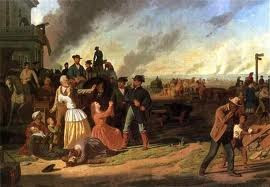
In researching the background for Terrel Lee Parker, the hero from my Christmas novella, An Ordinary Angel, I discovered that Terrel Lee was originally from Milledgeville, Georgia. Milledgeville was one of many towns within the path of Sherman’s famous “March to the Sea.” While Terrel Lee was away “fightin’ the Yankee vermin,” his family home was pillaged and destroyed.
That well known march from Kingston to Savannah, led by Major General William T. Sherman, was intended to break the backbone of the confederacy by destroying the factories, railroads and mills in order to hasten the end of the war. Arguing his case to General Grant and the military administration in Washington, Sherman declared, “Unless we can depopulate Georgia it is useless to occupy it, but the utter destruction of its roads, houses and people will cripple their military resources. I can make the march and make Georgia howl!”
From November 12 to December 22, Sherman led 53,923 infantry, 4,438 cavalry, and 1,718 artillery in four parallel columns on different roads, cutting a path of destruction 25 miles wide and over 300 miles long, and creating resentment so deep it still exists almost150 years later.
Sherman’s army occupied Savannah on December 21, 1864. The next day Sherman sent a dispatch to Fort Monroe to be telegraphed to President Lincoln, “I beg to present you as a Christmas gift the city of Savannah, with 150 heavy guns and plenty of ammunition, also about 25,000 bales of cotton.” The message reached the president on Christmas Eve.
But armies are made up of men, most of them good men who loved their families and only wanted to be home for Christmas.
On Christmas Day 1864, about 90 Michigan soldiers and their captain loaded several wagons full of food and other supplies. They rode into the ravaged countryside distributing the items to the destitute Southerners and brought a little bit of Christmas cheer to people who had no reason to celebrate. Grateful, the families thanked these unknown Union ‘Santa Clauses’ as the wagons pulled away under the power of mules that had tree-branch ‘antlers’ strapped to their heads.
 An excerpt from AN ORDINARY ANGEL
An excerpt from AN ORDINARY ANGEL
“I don’t hate you, Terrel Lee.”
“You have apologized already, Miss Julianne.”
She sighed. There it was again, the stiff formality she had come to hate. From the other side of the room, he lifted a trap door and motioned for her to join him.
“Why don’t you have any family pictures?” she asked as she peered into the black hole of what was obviously a root cellar.
He heaved an exhausted sigh. Tiny lines of pain etched the chapped skin around his mouth and eyes. His lips were taut and slightly blue. “They were destroyed when General Sherman burned his way through Georgia.”
“What happened to them?”
“I just told you.”
“No, I mean what happened to your family?”
“Julianne, we don’t have time for this. The bank robbers will be here any minute.”
“Please, it’s important to me.”
He surrendered with a defeated sigh. “My family had a large cotton plantation outside of Milledgeville, Georgia. I was the youngest of five. My oldest brother, Beauregard, died of small pox while imprisoned at Camp Douglas in sixty-four. My sister, Emily Rose, died in child-birth, overworked and undernourished, her husband killed at Shiloh. James Robert, died from wounds he received at Cold Harbor. And Samantha Jane killed herself after she was cruelly violated by a loathsome piece of Yankee vermin durin’ Sherman’s march to the sea. My father was shot tryin’ to protect her.” Though what he said had to be painful, he delivered the information in an emotionless, monotone voice.
“I tried to keep things goin’ once I returned home, but the house had been burned to the ground, we owed money in taxes, and Yankee carpetbaggers were crawlin’ out from under every rock. After my mother finally succumbed to her broken heart, I sold what I could and moved out here to start again.”
Her gaze locked with his.
“Is there anythin’ more you wish to know?”
That well known march from Kingston to Savannah, led by Major General William T. Sherman, was intended to break the backbone of the confederacy by destroying the factories, railroads and mills in order to hasten the end of the war. Arguing his case to General Grant and the military administration in Washington, Sherman declared, “Unless we can depopulate Georgia it is useless to occupy it, but the utter destruction of its roads, houses and people will cripple their military resources. I can make the march and make Georgia howl!”
From November 12 to December 22, Sherman led 53,923 infantry, 4,438 cavalry, and 1,718 artillery in four parallel columns on different roads, cutting a path of destruction 25 miles wide and over 300 miles long, and creating resentment so deep it still exists almost150 years later.
Sherman’s army occupied Savannah on December 21, 1864. The next day Sherman sent a dispatch to Fort Monroe to be telegraphed to President Lincoln, “I beg to present you as a Christmas gift the city of Savannah, with 150 heavy guns and plenty of ammunition, also about 25,000 bales of cotton.” The message reached the president on Christmas Eve.
But armies are made up of men, most of them good men who loved their families and only wanted to be home for Christmas.
On Christmas Day 1864, about 90 Michigan soldiers and their captain loaded several wagons full of food and other supplies. They rode into the ravaged countryside distributing the items to the destitute Southerners and brought a little bit of Christmas cheer to people who had no reason to celebrate. Grateful, the families thanked these unknown Union ‘Santa Clauses’ as the wagons pulled away under the power of mules that had tree-branch ‘antlers’ strapped to their heads.
 An excerpt from AN ORDINARY ANGEL
An excerpt from AN ORDINARY ANGEL“I don’t hate you, Terrel Lee.”
“You have apologized already, Miss Julianne.”
She sighed. There it was again, the stiff formality she had come to hate. From the other side of the room, he lifted a trap door and motioned for her to join him.
“Why don’t you have any family pictures?” she asked as she peered into the black hole of what was obviously a root cellar.
He heaved an exhausted sigh. Tiny lines of pain etched the chapped skin around his mouth and eyes. His lips were taut and slightly blue. “They were destroyed when General Sherman burned his way through Georgia.”
“What happened to them?”
“I just told you.”
“No, I mean what happened to your family?”
“Julianne, we don’t have time for this. The bank robbers will be here any minute.”
“Please, it’s important to me.”
He surrendered with a defeated sigh. “My family had a large cotton plantation outside of Milledgeville, Georgia. I was the youngest of five. My oldest brother, Beauregard, died of small pox while imprisoned at Camp Douglas in sixty-four. My sister, Emily Rose, died in child-birth, overworked and undernourished, her husband killed at Shiloh. James Robert, died from wounds he received at Cold Harbor. And Samantha Jane killed herself after she was cruelly violated by a loathsome piece of Yankee vermin durin’ Sherman’s march to the sea. My father was shot tryin’ to protect her.” Though what he said had to be painful, he delivered the information in an emotionless, monotone voice.
“I tried to keep things goin’ once I returned home, but the house had been burned to the ground, we owed money in taxes, and Yankee carpetbaggers were crawlin’ out from under every rock. After my mother finally succumbed to her broken heart, I sold what I could and moved out here to start again.”
Her gaze locked with his.
“Is there anythin’ more you wish to know?”
To Purchase: http://www.thewildrosepress.com/an-ordinary-angel-p-3796.html?zenid=6d4444b0f5dd478a038d52440e008317
Sources:
Christmas During the Civil War
By Walter Gable, Seneca County
The Civil War, A History
By Harry Hansen
Sources:
Christmas During the Civil War
By Walter Gable, Seneca County
The Civil War, A History
By Harry Hansen





